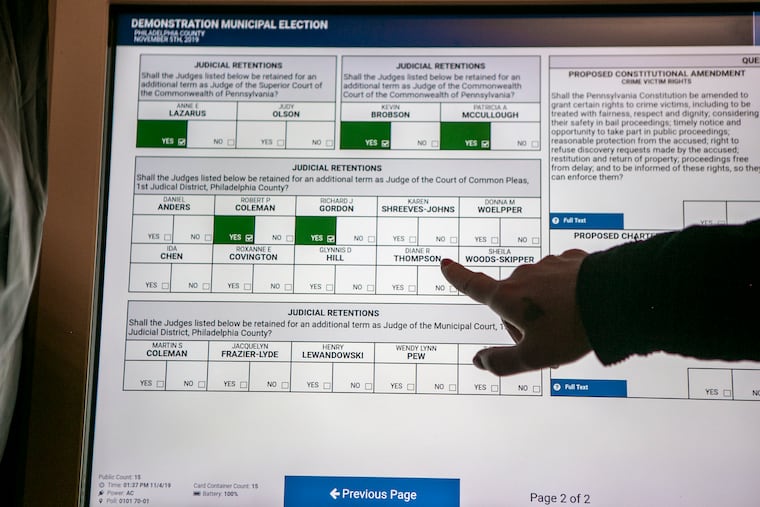Philadelphia’s new voting machines had a mostly smooth start. Now for the big test.
Election Day in Philadelphia last week was fairly normal, even with thousands of new voting machines being used for the first time. Now the big test is in 2020.

It wasn’t a disaster. There was no mass chaos, nor were there big security breaches, machines breaking down, or widespread allegations of fraud or mismanagement.
Election Day in Philadelphia last week was fairly normal, even with thousands of new voting machines being used for the first time.
There were a couple of bumps, both the kind that occur every election — a poll worker oversleeps, a door is left locked at a polling place — and the inevitable growing pains as workers and voters learned new machines.
But for the most part, things seemed to go well on Election Day, according to interviews with voters, poll workers, election officials, and voting-rights and good-government groups.
The big test comes next year: Despite decent turnout for the local election last week, the 2020 election will bring out many more voters, meaning many — if not most — will be using the machines for the first time. Those voters also tend to be less politically engaged than those who vote in off years, making them more likely to be confused by or encounter issues using them.
“This was one of the reasons why it was so important for us to roll the voting system out in November, just to get a little bit less of a pressure-packed election under our belt,” said Nick Custodio, the deputy city commissioner who has been leading efforts to implement the new system.
Critics have taken issue with the city’s selection of ExpressVote XL from Election Systems & Software, saying officials chose the touchscreen system in a rushed and opaque process that didn’t fairly consider hand-marked paper ballots. Some advocates say the paper ballots are more secure and cheaper.
The city commissioners, who oversee elections and are elected themselves every four years, say they were forced to move quickly because of Gov. Tom Wolf’s order last year that every county buy new systems in time for the 2020 election. Under that order, every machine in the state must leave a paper trail that can be manually audited or recounted. Previously, most voters, including Philadelphians, voted on electronic machines with no paper record.
“I liked that I was able to confirm my votes,” said Molly Gleeson, 39, who voted at Fishtown’s Lutheran Settlement House. “I feel like it will help eliminate some of the problems with voting systems that we’ve seen in the past.”
Similarly, William Jones, 62, of Mount Airy, gave the system his approval: “They’re pretty neat. It’s real easy, you just put it in there, and it gives you a chance to review it or spoil it and start over. It’s quick.”
There were some problems last week, such as a design similar to the old ballots that led some voters to press a box near the space between two columns — rather than within one column — inadvertently triggering the wrong selection.
Other voters reported difficulty reading the ballots once their selections were printed, confusion when they went to cast their vote and being taken to a second full page of judicial retention questions, and general uncertainty about how to use a new system.
“They’re a little tricky. You’ve got to feed the paper in the right way, so it’s taking some getting used to,” said Chris Day, 61, of Mount Airy, who had previously tested the system during jury duty in the earlier. “It’s different. It takes longer.”
» READ MORE: What Pa. counties can learn from voters’ reactions to Montgomery County’s paper-ballot rollout
Some problems involved poll workers, including at least one machine with a compartment left open — which would not have affected the paper ballots, but could affect tallying of unofficial results on election night — and workers not knowing where the paper ballots were stored. Custodio, the deputy city commissioner, said elections officials will alter poll worker training to address some of the issues that cropped up.
Turnout next year will likely be double what it was last week, if not higher, setting up a tall task to educate voters about the new machines. Philadelphia has more than 1 million registered voters.
There’s also one more unknown to watch next year: Some voters seemed to take longer to cast a ballot this election, which could lead to extra-long lines, and potentially some people leaving without voting. On the other hand, there will be fewer races on the ballot, and expanded vote-by-mail could reduce some of the pressure on polling places.
In the months leading up to the election, officials held hundreds of in-person demonstrations at locations across Philadelphia, set up a website demonstrating how the system works, and mailed a postcard to every registered voter’s address on file.
» READ MORE: Voters and poll workers had issues with Montgomery County’s new paper ballots. Here’s the plan moving forward.
Still, there are bound to be plenty of voters next year who have no idea there are new machines or how to use them. Custodio said commissioners will continue to hold live demonstrations and try to reach as many voters as possible.
Staff writers Allison Steele and Nick Vadala contributed to this article.